Cholesterol Lowering Foods List
THIS POST MAY CONTAIN AFFILIATE LINKS. PLEASE SEE OUR FULL DISCLOSURE POLICY FOR DETAILS.
Can certain foods help you lower your cholesterol? Absolutely! Although it might seem challenging to change the way you eat, everything on this list of cholesterol lowering foods will help you improve your outlook.
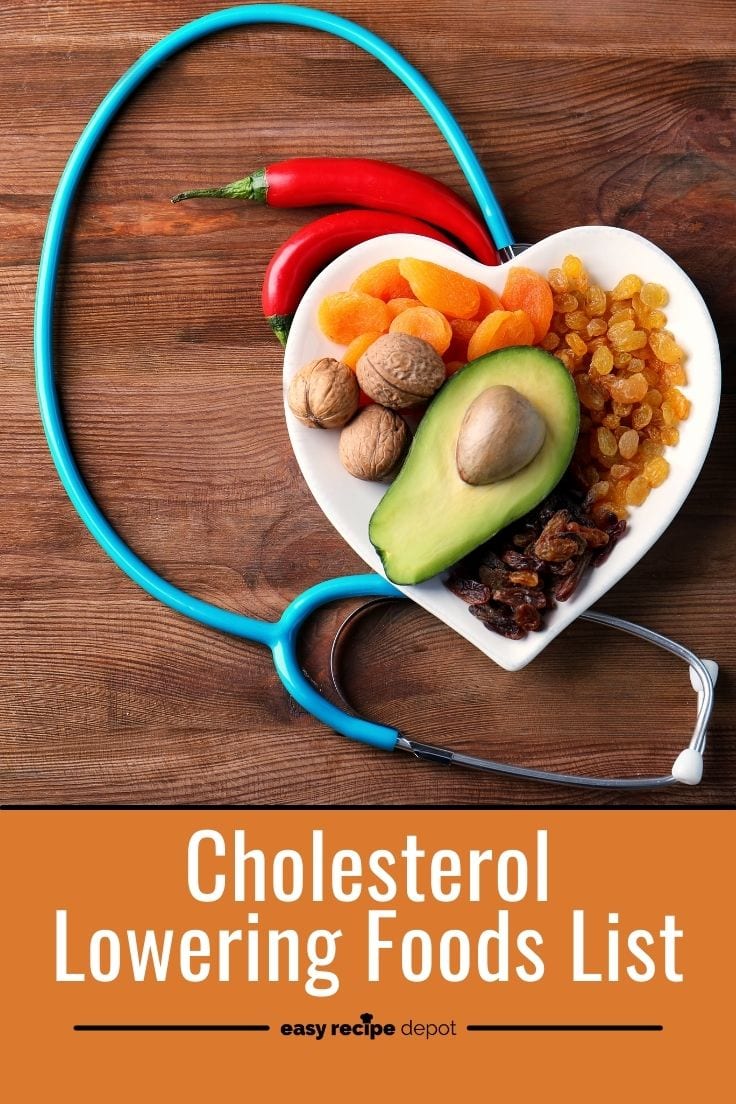
Besides offering a list containing more than 300 of the best foods to reduce cholesterol, this guide provides insight into the benefits that come with following a low-cholesterol diet, plus snack ideas and easy lifestyle strategies for getting your numbers into a healthier place.
Benefits of a Low-Cholesterol Diet
The benefits of a low cholesterol diet have been proven in one study after another. Since the body automatically produces all the cholesterol it needs for vital functions such as making hormones and other substances, there’s no need to consume it as part of your diet.
Unfortunately, most people who follow the Standard American Diet also eat far too much cholesterol. When this happens, excess builds up as hard plaque inside artery walls, eventually leading to heart disease. While there are other risk factors for heart disease including unchangeable ones like your age and your family’s history of heart disease, cholesterol intake is a factor you can control. Combined with other heart-healthy changes, a low cholesterol diet can
The thought of cutting back or even giving up your favorite fatty foods might have you wondering whether the benefits of a low-cholesterol diet are worth the effort.
As it turns out, they’re all major game-changers:
- Weight loss
- Decreased risk of developing heart disease
- Reduced risk of heart attack
- Reduced risk of stroke
- Reduced risk for obesity-related diseases
You should know that there are no known risks associated with following a low-cholesterol diet. As part of a healthy lifestyle, this way of eating allows you to enjoy a vast variety of foods from every group while emphasizing heart-healthy choices.
Low Cholesterol Food Shopping List
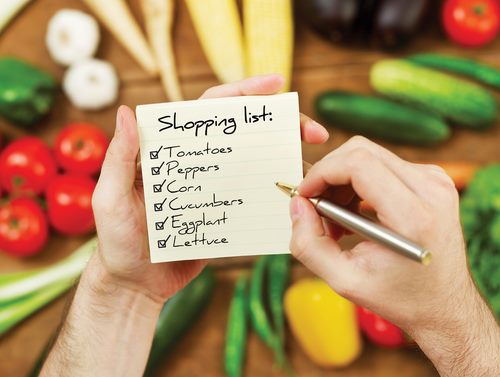
This extensive list of cholesterol-lowering foods includes items that contain little or no cholesterol, saturated fat, and/or trans fat such as hydrogenated or partially-hydrogenated vegetable oil. All three of these substances can increase your blood cholesterol. Additionally, you’ll find foods that are high in soluble fiber, which binds to cholesterol particles inside the small intestine and prevents it from working its way into your bloodstream.
Meats
Since poultry with skin and fatty cuts of meat contain high levels of saturated fat and cholesterol, you’ll want to avoid these completely. The good news is that there are many lean meats available, should you decide to include them in your diet.
Check labels to ensure that the meats you choose are at least 96% fat free, and be sure to trim any visible fat before cooking. Pay close attention to serving sizes, and aim for no more than five ounces of fish- or animal-based protein per day.
- Antelope, lean cuts
- Beef round, preferably grass-fed
- Beef sirloin, preferably grass-fed
- Beef tenderloin, preferably grass-fed
- Beefalo, lean cuts, grass-fed
- Buffalo, lean cuts, grass-fed
- Chicken breast, skinless
- Elk, lean cuts
- Pork tenderloin, preferably heritage and/or pastured
- Turkey breast, skinless
- Venison, lean cuts
Fish and Seafood
Freshwater fish, saltwater fish, and certain shellfish are often excellent choices. According to the American Heart Association, it’s a good idea to consume omega-3 rich fish at least twice weekly. Herring, mackerel, salmon, sardines, and tuna are excellent choices. Others are good, low-cholesterol options as well.
Be sure to remove skin and trim visible fat as you prepare your seafood, and when opting for tinned varieties, look for those canned in water rather than oil.
- Albacore
- Clams
- Cod
- Crab
- Crawfish
- Halibut
- Herring
- Lobster
- Mackerel
- Oysters
- Salmon
- Sardines
- Scallops
- Shrimp
- Trout
- Tuna
Eggs, Dairy Products and Alternatives
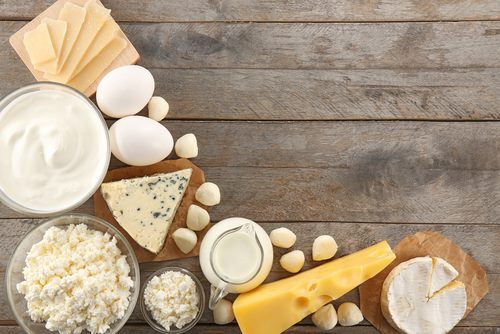
Because egg yolks and whole-milk dairy products contain high levels of saturated fat and cholesterol, you will want to strictly limit or even avoid them completely. Plant-based alternatives are beneficial, and they are delicious. Try them: You’ll be pleasantly surprised.
- Almond milk, no sugar added
- Buttermilk, nonfat varieties only
- Cashew milk, no sugar added
- Cheese, nonfat varieties only
- Coconut milk, no sugar added (non-canned, light, or low-fat varieties)
- Coconut yogurt, no sugar added
- Condensed milk, nonfat varieties only
- Dairy-free creamer, no sugar added
- Dairy-free ice cream, no sugar added
- Eggs, whites only
- Evaporated milk, nonfat varieties only
- Greek yogurt, nonfat varieties with no sugar added
- Hazelnut milk, no sugar added
- Hemp milk, no sugar added
- Macadamia nut milk, no sugar added
- Milk, nonfat only
- Oat milk, no sugar added
- Pea-protein based milk like Ripple, no sugar added
- Rice milk, no sugar added
- Sour cream, nonfat only
- Soymilk, no sugar added
- Soy yogurt, no sugar added
- Walnut milk, no sugar added
- Yogurt, nonfat varieties with no sugar added
Fats
Fats from animal sources – including butter and lard – are noticeably absent from this food list. Cholesterol-lowering oils are included, however, plant-based oils such as palm oil and coconut oil are omitted due to the high levels of saturated fat that they contain. Because vegetable shortening contains trans fats, it is also omitted.
As a general guide, heart-healthy fats are those that remain in a liquid or mostly liquid state when refrigerated. When reading labels, look for foods that contain monounsaturated fat and/or polyunsaturated fat. Both of these are cholesterol-lowering fats.
- Avocado oil
- Canola oil
- Flaxseed oil (not for cooking; best for salad dressings)
- Grapeseed oil
- Hazelnut oil
- Hemp oil
- Macadamia nut oil
- Margarine, cholesterol-lowering tub varieties such as Benecol, Take Control, and others with the American Heart Association’s seal of approval
- Olive oil
- Peanut oil
- Pumpkin seed oil
- Sesame oil (good for salad dressings; add at the end of cooking to impart flavor)
- Soybean oil
- Sunflower oil, high-oleic versions
- Walnut oil (not for cooking; best for salad dressings)
- Wheat germ oil (not for cooking; best for salad dressings)
Vegetables
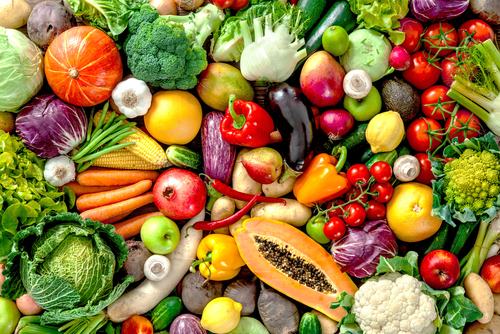
All vegetables offer benefits, so try to incorporate them into every meal and eat as many colors as you can each day to improve your nutrition. This cholesterol lowering foods list is an extensive one, with more than 50 delicious vegetables to enjoy. Don’t be afraid to try veggies that are not included; so long as they don’t come with cheesy sauces or additives such as lard, rendered fat, or meat, they are likely to provide benefits. Try to place an emphasis on dark leafy greens and bright orange veggies such as butternut squash and sweet potatoes.
- Acorn squash
- Artichokes
- Asparagus
- Avocado
- Beets
- Beet greens
- Bell peppers
- Bok choy
- Broccoli
- Brussels sprouts
- Butter lettuce
- Buttercrunch lettuce
- Butternut squash
- Cabbage
- Carrots
- Cauliflower
- Celery
- Celery root
- Collard greens
- Eggplant
- Endive
- Jalapeno peppers
- Jerusalem artichokes
- Green beans
- Green leaf lettuce
- Kale
- Kohlrabi
- Lima beans
- Napa cabbage
- Okra
- Onions
- Palm hearts
- Parsnips
- Peas
- Red cabbage
- Red leaf lettuce
- Rutabaga
- Serrano peppers
- Snap peas
- Snow peas
- Spaghetti squash
- Spinach
- Sweet potatoes
- Swiss chard
- Tomatoes
- Tomato paste
- Tomato sauce
- Turnips
- Turnip greens
- Yams
- Yellow squash, straight and crookneck varieties
- Zucchini
Fruits

Like vegetables, all fruits have cholesterol-lowering benefits to offer. Because fruit contains sugar, you’ll want to keep your intake at a reasonable level, particularly if you are trying to lose weight. This list offers 50 choices, and there are many others to try, too. Focus on fresh and frozen fruits, and enjoy small amounts of dried fruit as well. If your only alternative is canned fruit, choose options that are canned in juice instead of sugary syrup.
- Apples
- Apricots
- Bananas
- Blackberries
- Blackcurrants
- Blueberries
- Boysenberries
- Cantaloupe
- Cherries
- Christmas melon
- Clementines
- Cranberries
- Crane melon
- Crenshaw melon
- Currants
- Dates
- Dragonfruit
- Elderberries
- Figs
- Gooseberries
- Grapes, all varieties
- Grapefruit
- Guavas
- Honeydew melon
- Huckleberries
- Kiwis
- Kumquats
- Lemons
- Limes
- Lychees
- Loganberries
- Mandarins
- Mangos
- Mulberries
- Nectarines
- Oranges
- Papayas
- Passionfruit
- Paw paws
- Peaches
- Pears
- Pineapples
- Plums
- Pomegranates
- Prunes
- Raspberries
- Starfruit
- Strawberries
- Watermelon
- Winter melon
Grains
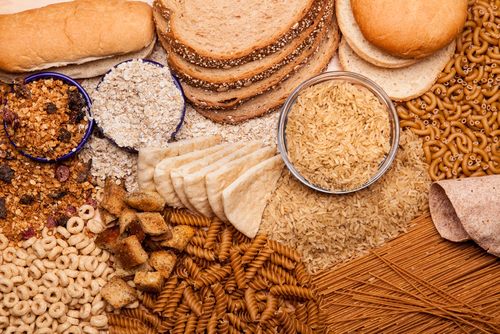
Whole grains are among the best foods for reducing cholesterol, so you’ll want to enjoy them as often as possible. Be sure that packages say “whole grain” and double-check to ensure that most options contain soluble fiber. Whole grains stick with you longer so you feel full, particularly when you combine them with other high-fiber choices like vegetables, fruits, legumes, seeds, and nuts. Look for crackers, breads, bagels, wraps, pasta, and tortillas made with the following grains, and enjoy the grains on their own or mixed into recipes.
- Amaranth
- Barley
- Black rice
- Brown basmati rice
- Brown rice
- Buckwheat
- Bulgur
- Cornmeal
- Kamut
- Millet
- Oats
- Oat bran
- Oat flour
- Oatmeal
- Polenta
- Popcorn, plain varieties only, preferably air-popped
- Pumpernickel
- Quinoa
- Red rice
- Rye
- Spelt
- Sprouted grains
- Wheat berries
- Wheat bran
- Whole wheat flour
- Whole white wheat flour
- Wild rice
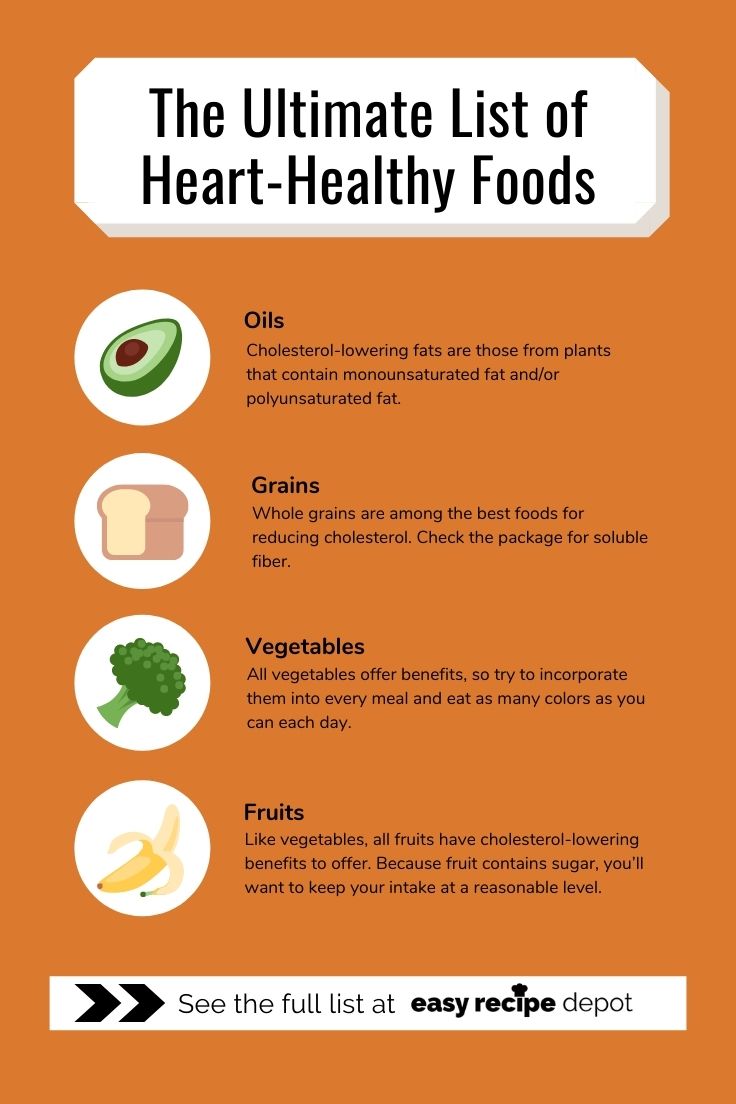
Legumes

Like vegetables, fruits, and whole grains, legumes are an excellent source of soluble fiber, plus they’re high in protein. Eat one cup of legumes daily, and you could lower your cholesterol by up to ten percent over the course of six seeks. Many people are reluctant to include legumes in their diets out of concern over excess gas and bloating. While this can be a problem at first, your body will adjust. Try taking Beano if you’re worried about legumes and other foods that contribute to flatulence; it contains natural digestive enzymes that keep gas from forming.
Dried, frozen, and canned beans are all great additions to your diet. If you choose canned varieties, opt for low-sodium versions and rinse them well to remove excess salt. Use them to make dips, sandwich fillings, soups, chilis, and more.
- Adzuki beans
- Black adzuki beans
- Black beans
- Black eyed peas
- Cannellini beans
- Cranberry beans
- Fava beans
- Garbanzo beans (chickpeas)
- Great northern beans
- Kidney beans
- Lentils
- Navy beans
- Pigeon peas
- Pink beans
- Pinto beans
- Rattlesnake beans
- Red beans
- Red lentils
- Refried beans, vegetarian and nonfat varieties
- Split peas
- Turtle beans
- White beans
- White kidney beans
- Yellow beans
- Yellow lentils
- Yellow peas
Nuts and Seeds
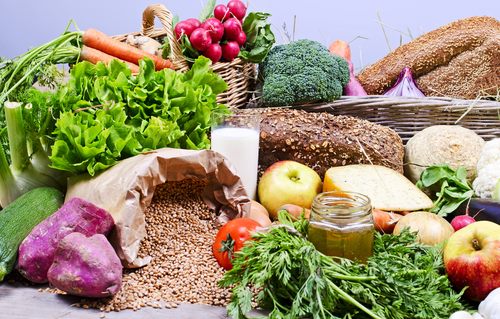
Nuts and seeds are brimming with soluble fiber, and they’re a great source of plant-based protein, healthy fat, vitamins, and minerals. While nuts contain some saturated fat, they’re also an important source of plant sterols, which help reduce cholesterol. Use portion control with your nuts and nut butters, and be sure to read labels as you shop, since many types contain undesirable additives like trans fat, lots of salt, and added sugars. Your body will thank you even more for purchasing raw nuts and then seasoning and roasting them yourself! Seeds are a great source of Omega-3 fatty acid and other beneficial compounds, so try to incorporate them into baked goods, salads, and other foods as often as you can.
- Almonds
- Almond butter
- Brazil nuts
- Butternuts
- Cashew
- Cashew butter
- Chia seeds
- Flaxseeds, ground
- Hazelnuts
- Hazelnut butter
- Hickory nuts
- Macadamia nuts
- Peanuts
- Peanut butter
- Pecans
- Pistachios
- Poppy seeds
- Pumpkin seeds
- Squash seeds
- Sunflower seeds
- Sunbutter (sunflower seed butter)
- Walnuts
Condiments and Supplements
Herbs and spices help you cut back on salt while adding flavor to your food. The same can be said of vinegars and other condiments. While you don’t have to cut salt completely, doing so can help you keep your blood pressure at a healthy level, benefitting your heart and making it easier for your body to function properly.
This list contains 60 choices to try – and there are many other options to explore! Next time you’re shopping, see what’s on offer and consider trying something new.
You’ll notice that several soy products are included in this cholesterol lowering foods list – and for good reasons. Whole soybean products contain phytates, isoflavones, and protein, all of which combine to help reduce your cholesterol while treating you to satisfying protein. Tofu has a bad reputation as boring, bland, “hippie” food.
Learn to prepare it properly by pressing out the excess moisture, marinating it in something tasty, and baking it or crumbling it into recipes, and you’ll be pleasantly surprised. According to the FDA, consuming at least 25 grams of soy protein daily helps lower high cholesterol – so give it a chance!
- Angelfood cake, preferably no sugar added
- Apple cider vinegar; Bragg’s or another brand with “The Mother”
- Applesauce, no sugar added (ideal for replacing fat in recipes for baked goods)
- Balsamic vinegar, all flavors
- Barbecue sauce, preferably low-sodium, low-sugar varieties
- Basil
- Bragg’s liquid aminos (a good replacement for high-sodium soy sauce)
- Broths and soups, preferably low-sodium, fat-free or low fat varieties (read labels carefully)
- Brown rice cakes
- Cayenne pepper
- Chili powder
- Cilantro
- Cinnamon
- Cloves
- Cooking spray
- Coriander
- Cumin
- Dark chocolate, preferably sweetened with stevia
- Fruit juices, small amounts with no added sweeteners
- Garlic, preferably fresh
- Ginger
- Greek seasoning, preferably low sodium
- Ketchup, preferably low-sodium
- KIND bars and similar whole food plant based snack bars
- Pickles, preferably low sodium and low sugar varieties
- Plant based or vegan mayonnaise like Veganaise or JUST Mayo
- Plant-based smoothie mix like Orgain or Vega
- Popcorn cakes
- Pretzels, whole grain
- Meatless crumbles such as Beyond Beef or Gardein
- Mustards, all varieties
- Nutmeg
- Olives
- Paprika, all varieties including smoked and hot Hungarian
- Parsley
- Pear vinegar
- Ponzu sauce, low sodium varieties
- Potato chips, baked, low-sodium varieties
- Raspberry vinegar
- Red wine, preferably dry varieties
- Red wine vinegar
- Rice vinegar
- Salad dressings, no cholesterol varieties, preferably low sodium
- Seitan
- Sherbet, nonfat varieties, preferably no sugar added
- Sorbet, preferably fruit-only
- Soy sauce, low-sodium varieties
- Tea, all varieties, hot and/or iced; no sugar added
- Tempeh
- Teriyaki sauce, low-sodium varieties
- Tofu
- TVP (textured vegetable protein) – An excellent replacement for ground meat in recipes of all types
- Turmeric, preferably organic American-grown
- Veggie burgers
- Veggie dogs
- Veggie sausages
- Veggie slices such as Tofurkey
- Vitamins and minerals: Because you are cutting back on animal products, you’ll want to supplement with vitamin B12 at a minimum. You may also want to supplement iron and calcium. A good daily multivitamin is often sufficient; check with your doctor or meet with a nutritionist to see if there are any others you should take.
- White vinegar
- White wine vinegar
Low Cholesterol Snacks
It’s very important to keep hunger in check as you change the way you eat. You’re probably familiar with the feelings of temptation that pop up when old, unhealthy favorites are available; it’s far easier to resist when you’ve already filled up on beneficial foods.
- Air-popped popcorn
- Apple with 1 tablespoon of nut butter
- Baked potato or sweet potato chips (preferably homemade)
- Celery sticks with 1 tablespoon of nut butter
- Edamame
- Granola, preferably low-sugar, low fat variety made with oats
- Orange and 2 tablespoons of walnuts
- Pear and 2 tablespoons of raw almonds
- Rice cakes or popcorn cakes with nut butter and berries
- Roasted chickpeas
- Soynuts
- Trail mix made with 2 tablespoons of nuts, a small handful of sunflower seeds, a small handful of dried fruit, and a tablespoon of dark chocolate chunks
- Veggies with hummus or black bean dip
- Whole grain crackers with nut butter and fruit
- Yogurt with berries
Additional Strategies for Lowering Your Cholesterol
Besides consuming items from your cholesterol-lowering foods list, consider adding a few more components to your plan:
- Consider switching to a plant-based diet, either temporarily or permanently. Many people are concerned that their health will suffer if they omit animal products, however, the opposite is true. Plant-based proteins are among the best items on the cholesterol lowering foods list, and focusing on them can help you regain health quickly. As an alternative to a total switch to plant-based eating, you might consider following a clean vegan diet every other day or five days per week. Even a “Meatless Monday” habit will help. All of these strategies provide excellent benefits, and you can easily supplement with iron and B12 to ensure that you are getting all the nutrients you need.
- Eat frequently. Skipping meals can lead to hunger and increase the likelihood that you’ll make poor food choices later in the day.
- Eat a wide variety of foods each week. Try to eat more than five servings of vegetables daily.
- Keep track of your daily calorie intake with an app like SparkPeople or My Fitness Pal. Losing excess weight is a good way to work toward reducing your cholesterol. There’s no need to resort to extreme dieting; instead, find a calorie level that is comfortable for you and reasonable for your lifestyle.
- Start exercising. Begin where you are, and gradually increase your activity level. If it has been a while since you last engaged in intentional movement, you should talk with your doctor about the best course of action. Easy activities to try include walking, slow bicycling on flat terrain, simple stretching, swimming, and yoga. Try to exercise a little each day.
- If you smoke, stop.
- Cut back on alcohol, which is full of empty calories. Celebrate special occasions with a heart-healthy choice such as a glass of red wine, if you like.
- Reduce your sugar intake and watch out for fast-acting carbohydrates, which rapidly turn to sugar in your bloodstream. High sugar intake increases your diabetes risk as well as your risk of heart disease. According to The American Heart Association, women should have no more than 6 teaspoons of sugar (100 calories worth) daily, and men should aim for no more than 9 teaspoons of sugar (150 calories worth) daily. Cut major culprits like cookies, desserts, candies, soda, and other sweetened beverages for a quick fix.
- Have your cholesterol checked regularly, so that you can confirm that your plan is working and confront any issues head-on. You can use your tests as a tool for motivation, too.
Do ensure that you check in with your doctor as you make lifestyle changes, and be sure that you ask for guidance and clarification. He or she will be able to provide you with specific instructions for your unique situation, and it’s possible that other resources such as smoking cessation, medically supervised weight loss, prescription drugs, and specifically tailored exercise programs may be available. Take advantage of these and you’ll be surprised at how quickly you reach your goals.
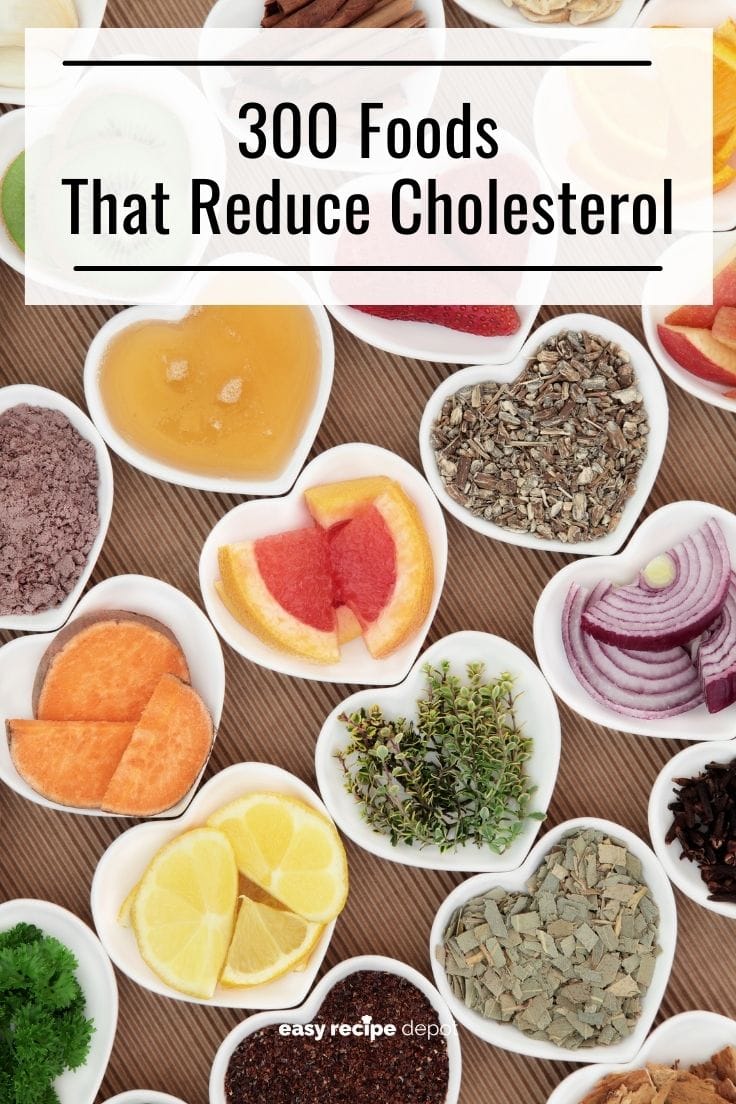
Sources:
- National Institute Of Health
- Very Well
- Health.Gov Guidelines
- Cleveland Clinic
- WebMD
- FDA Access Data
- Prevention Magazine
More Food Resources
If you enjoyed learning about cholesterol lowering foods, here are some more food resources you might find helpful next.

